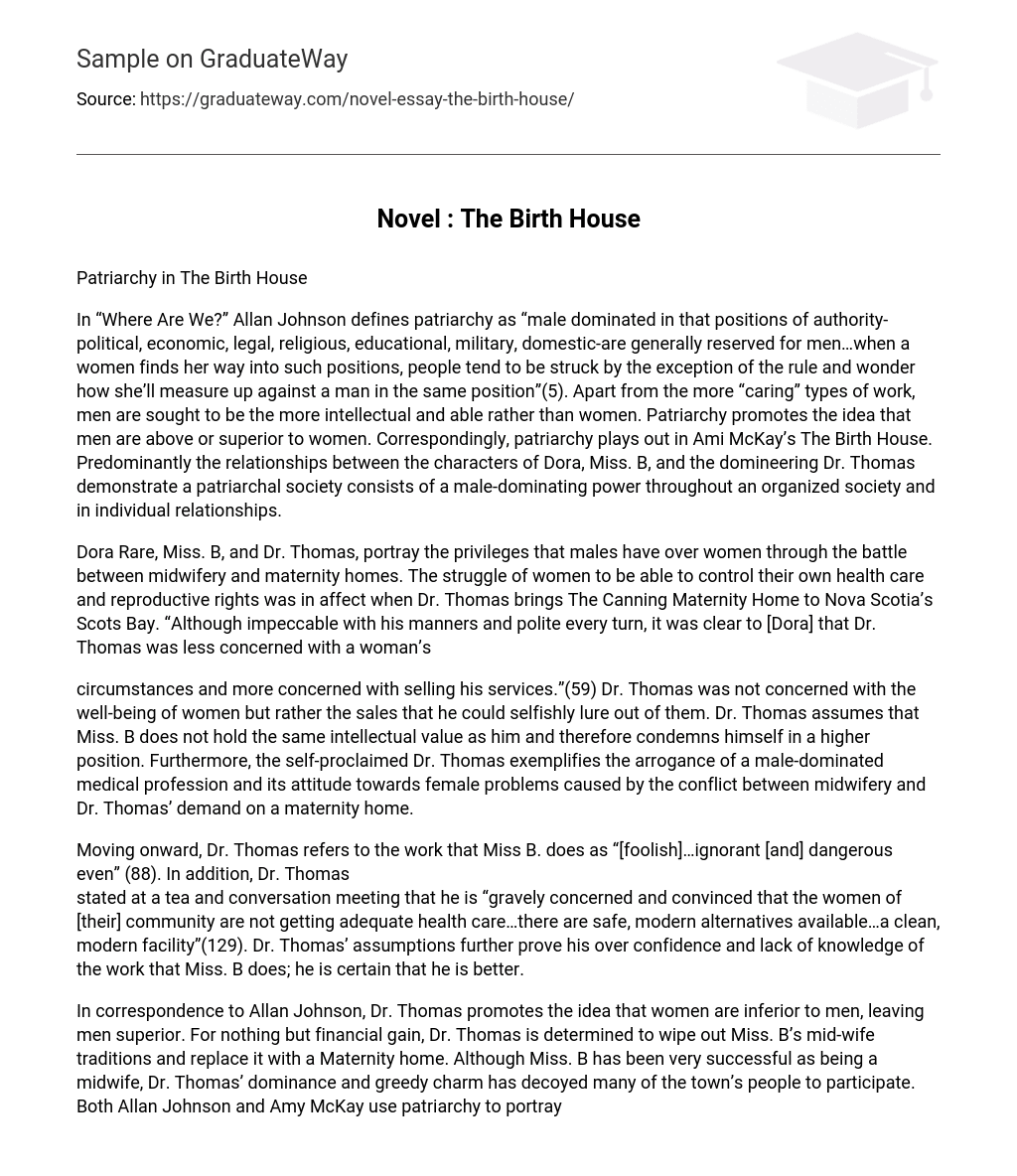Patriarchy discussed in The Birth House
According to Allan Johnson’s work “Where Are We?”, patriarchy is the dominance of men in various positions of power, such as political, economic, legal, religious, educational, military, and domestic roles. Typically held by men, these positions are viewed as anomalies when occupied by women. Doubts arise regarding a woman’s capabilities compared to a man in the same position (5). Society generally perceives men as more intellectually competent than women, reinforcing this belief through patriarchy. Ami McKay’s novel The Birth House demonstrates this patriarchal dynamic through relationships among characters like Dora, Miss B, and influential Dr. Thomas. These relationships reveal how patriarchy infiltrates both organized societies and personal connections.
The text highlights the portrayal of the privileges that men have over women through the conflict between midwifery and maternity homes. Dora Rare, Miss. B, and Dr. Thomas play significant roles in this battle. Dr. Thomas introduces The Canning Maternity Home in Nova Scotia’s Scots Bay, which further emphasizes the struggle women face in controlling their healthcare and reproductive rights. Despite Dr. Thomas’s seemingly impeccable manners and politeness, Dora clearly perceives his lack of concern for women’s needs.
Dr. Thomas prioritized selling his services over caring for women’s well-being. He disregarded the intellectual value of Miss B, considering himself superior. His arrogance reflects the male-dominated medical profession’s attitude towards female issues and the tension between midwifery and Dr. Thomas’ maternity home.
Dr. Thomas criticizes Miss B.’s work as “[foolish]…ignorant [and] dangerous even” (88). During a tea and conversation meeting, he expressed serious concerns about the women in their community not receiving sufficient healthcare. He believes there are better alternatives and a need for a clean and modern facility (129). Dr. Thomas’ assumptions demonstrate his excessive confidence and lack of understanding of Miss B.’s work, as he firmly believes he is superior.
In a letter to Allan Johnson, Dr. Thomas advocates for the belief that women are inferior to men, leaving men in a superior position. Driven by the desire for financial gain, Dr. Thomas is determined to eliminate Miss. B’s midwife customs and instead establish a Maternity home. Despite Miss. B’s successful track record as a midwife, Dr. Thomas’ dominant and greedy demeanor has tempted many of the town’s residents to support him. Both Allan Johnson and Amy McKay utilize patriarchy to illustrate the superiority that men possess.
women. Dora, Miss. B, and Dr. Thomas, along with the conflict between midwifery and modern day medicine, depict the significant impact of patriarchy and its lasting influence in today’s society.
Reflection:
Ami McKay is a skilled writer who adeptly transports readers to different historical periods and the lives of diverse characters. Having read one of McKay’s previous books, I had high expectations for this one as well. What I admire about both works is the recurring theme of women’s rights and their solidarity in seizing control over their own bodies. This novel specifically explores a woman’s autonomy in choosing her birthing method and location, disregarding medical professionals or her spouse’s opinions. Moreover, it delves into the concept of women determining when they desire to have children, which is incredibly empowering. One aspect that particularly resonated with me was a health concerns poster prominently displayed in Dr. Thomas’ office that addressed common emotions such as anxiety, fatigue, and melancholy (195). It significantly enhanced my overall enjoyment of the book.





